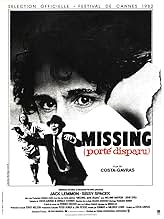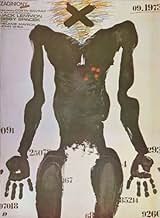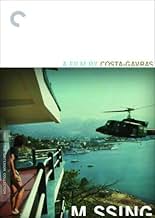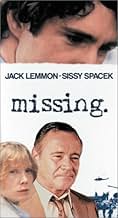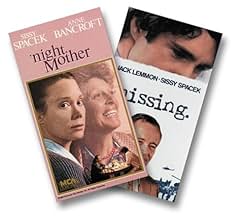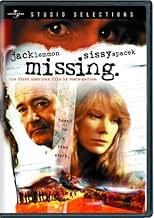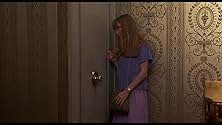Quando um idealista escritor americano desaparece durante o golpe de estado chileno em setembro de 1973, sua esposa e seu pai tentam encontrá-lo.Quando um idealista escritor americano desaparece durante o golpe de estado chileno em setembro de 1973, sua esposa e seu pai tentam encontrá-lo.Quando um idealista escritor americano desaparece durante o golpe de estado chileno em setembro de 1973, sua esposa e seu pai tentam encontrá-lo.
- Direção
- Roteiristas
- Artistas
- Ganhou 1 Oscar
- 12 vitórias e 23 indicações no total
- Paris
- (as Martin Lasalle)
Avaliações em destaque
Govras chose as background for his film the actual diaries of Charles Horman, a lefty artist type who was living with his wife Beth in Chile. Horman had apparently picked up the unfortunate habit of inquiring into some dangerous affairs in a rather loud way. Isolated in every sense from any "live" political current, his disappearance and murder were relatively easy to accomplish, even though he was a United States citizen. The actor John Shea portrays Charles Horman as a naive sort, and there is no reason to assume this was an inaccurate depiction. Most citizens of the United States overseas are sheltered from the skulduggery of realpolitik, and most cling to some rather dangerous illusions about how far their rights as citizens actually extend. U.S. citizens in Lebanon who had to pay for their removal from that combat front last summer have learned this the hard way recently.
Jack Lemmon is stellar as Charles' father Ed Horman, who made the trip to Chile under the impression that he had rights his government felt bound to respect, and who discovered otherwise. And Cissy Spacek is never anything less than full marks as Beth Horman.
MISSING accomplishes what few political dramas do. It asks its viewer to consider the human dimensions and costs of an imperial political reality, and it portrays with a deadly earnestness what these ideas do to people caught up in the sway of such notions. There are no monsters in MISSING, just people who are doing their jobs and following orders. And therein lies the horror, one which all too many of our fellow citizens have yet to come to grips with. It is a rare feat among political films, an actual work of art. But don't be surprised if you need a stiff drink after viewing it. That's how I felt when I first saw this work after its release in 1982, and it still has that effect upon me today.
In his American works,while continuing his militant way,Costa-Gavras puts men and women made of flesh and blood on the screen:Jack Lemmon,who made us laugh so many times in Billy Wilder's masterpieces("some like it hot" "kiss me stupid" "the apartment",the highly underrated "Avanti"),shines in his dramatic part;his portrayal of an all-American man,proud of his country,who cannot really understand the evolution of the new generations but who knows that he's got only one son,whom he might never see again,is mind-boggling:his tired and sad face,always seeming on the verge of tears ,mainly in the second half of the movie which contains two classic scenes:
-The first one takes place in the stadium,where the prisoners are gathered;he's given a mike ,but a lump comes to his throat and he hands it to Sissi Spacek -who plays (with talent) the missing son's wife -;In the giant stadium,no echoes ,even when Lemmon,in a desperate call,asks his son to come home.
-The second one takes place in some kind of morgue,where dead bodies pile up.The wife and the father really go to hell,in this almost unbearable scene.
The Putsch (Costa-Gavras takes the American intervention for granted whereas there's nothing that proves it)takes a back seat to the desperate couple's plight.
Costa-Gavras has not completely forsaken France though:the book Spacek and Shea are reading is none other than Saint-Exupery's "le petit prince".
The film itself remains a gripping eyeopener from first to last. Costa-Gravas is especially good at recreating the abject terror of fascist rule: where long hair is forbidden and women are forced back into skirts, where people are present one minute and gone the next, where a democratically elected government is present one minute and gone the next, and where a Henry Kissinger can do the behind-the-scenes dirty work and be honored for it (not in the movie, but true nevertheless). The acting is first-rate, and a tour-de-force for Lemmon in particular. Ditto, the often overlooked Charles Cioffi who puts the real chill in the confrontation scene. Two complaints: the arch symbolism of the riderless white horse conflicts with Costa-Gravas's documentary approach, and why, oh why, did they have to make Horman's son so cuddly. The audience gets the point without spooning on the sugar. Anyhow, this remains a fine piece of revelatory film-making and retains as much relevancy for today's audience as it did twenty years ago.
Jack Lemmon gives another standout performance (in a career that had many) as the uptight father that learns to accept his son only after his suspected death. The emotional evolution from devout christian/disapproving dad to grieving father with 'opened eyes' is engaging to watch. Sissy Spacek shows the strength that should have won her a second oscar 2001 for "In The Bedroom" as the wife who never stops looking for her husband. But the clear winner in this politcal thriller is the director Costa Gravas, who constantly keeps the politcal tension high, without upstaging the performances of the leads.
A great drama that deal with life/death and the bond between parents and their children.
Você sabia?
- CuriosidadesDuring the Pinochet dictatorship, which ran from 1973 to 1990, this picture was banned in Chile.
- Erros de gravaçãoWhen Ed Horman is at the State Department trying to get information about Charlie, there is the presidential portrait of Richard Nixon on the wall in the background and a more personal photo of him on Marine One on the credenza behind the desk. That photograph, with fingers in the V-peace sign, was taken upon his final departure from the White House in 1974 and could not have been on someone's desk in 1973.
- Citações
Consul Phil Putnam: Please try to understand. There are so many cases. They're all so important, and this isn't the only one we're working on.
Ed Horman: It's the only one I care about.
Consul Phil Putnam: You and a lot of other people. Listen, I've never seen so many cables from Washington. What kind of pull do you have up there anyway?
Ed Horman: I'm an American citizen.
- Trilhas sonorasMy Ding a Ling
(1952)
Written by Chuck Berry (uncredited)
Performed by Chuck Berry
Courtesy of All Platinum Records, Inc.
Principais escolhas
Detalhes
- Data de lançamento
- Países de origem
- Idiomas
- Também conhecido como
- Desaparecido
- Locações de filme
- Acapulco, Guerrero, México(as Vina del Mar)
- Empresas de produção
- Consulte mais créditos da empresa na IMDbPro
Bilheteria
- Orçamento
- US$ 9.500.000 (estimativa)
- Faturamento bruto nos EUA e Canadá
- US$ 14.000.000
- Faturamento bruto mundial
- US$ 14.000.000
- Tempo de duração2 horas 2 minutos
- Cor
- Proporção
- 1.85 : 1
Contribua para esta página



